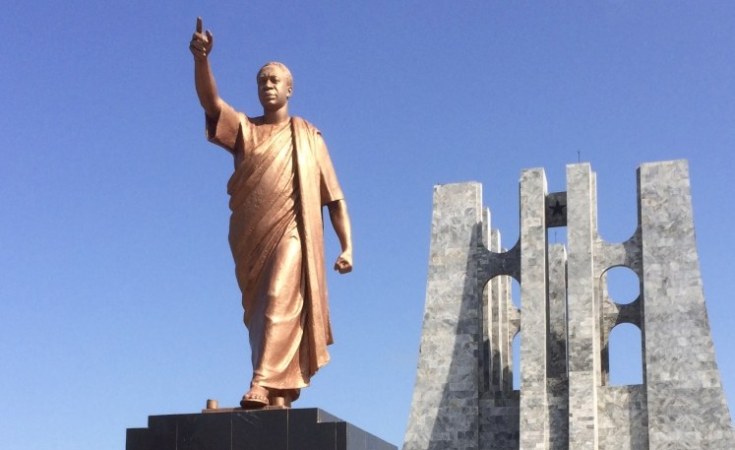Political parties are not always completely united, as most classical political scientists argue. Dissenting opinions and the scramble for party apparatus tend to trigger internal schisms and factions. If these aren't managed well, parties can split. A notable example is the recent emergence of splinter parties from the Justice and Development Party in Turkey.
In Ghana, all three of the country's main political traditions have experienced internal conflicts and sometimes party splits. The Danquah-Busia-Dombo, Nkrumahist and Provisional National Defence Council/Rawlings traditions differ in terms of ideology. The Provisional National Defence Council/Rawlings tradition subscribes to social democracy while the Danquah-Busiasts hold property-owning democratic ideals. The Nkrumahist group is known for socialist beliefs grounded in Nkrumahism - the philosophy of Ghana's first president, Kwame Nkrumah. This tradition focuses on self-reliance and pan-Africanism, and abhors neocolonialism.
The broad traditions have endured since the 1940s, but the parties within them are susceptible to conflicts.
My research explored the possible reasons for factions and schisms in the Nkrumahist parties. I focused on the Convention People's Party and the People's National Convention and interviewed present and past party technocrats, academics and media practitioners. I also reviewed the literature on intra-party conflict, factionalism and fragmentation in Ghana.
The breaking up of parties affects their electoral fortunes. Political party fragmentation often culminates in elite disarray and cynicism among voters.
Party schisms in Ghana
The first account of intra-party squabbles and splintering in Ghana occurred in 1949. This was when Nkrumah and some members of the United Gold Coast Convention youth wing rebelled to form the Convention Peoples Party. It marked the birth of the Nkrumahist tradition in Ghana.
The tradition has had the most splinter parties in Ghana over the years. The People's National Convention, National Independence Party, Peoples' Heritage Party and National Convention Party emerged in 1992. The Progressive People's Party was formed in 2012 and the All People's Congress in 2016.
The Danquah-Busia tradition has also experienced some splits. The most devastating one occurred ahead of the 1979 elections. The tradition, which had just recovered from a coup in 1972, divided into two feuding groups and ultimately two parties emerged: the Popular Front Party and the United National Convention.
Disagreements within the Provisional National Defence Council/Rawlings-inspired National Democratic Congress resulted in splinter parties like the National Reform Party in 1992, Democratic Freedom Party in 2006 and National Democratic Party in 2012.
Despite the divisive tendencies within the National Democratic Party and the New Patriotic Party, they have managed the problems in order to sustain their dominance of Ghanaian politics. However, the Convention Peoples Party and the People's National Convention have failed to manage theirs.
Diagnosis of the problem
I found three major factors that help explain the instability within the Nkrumahist tradition.
First, there is evidence of a personality cult, especially among the "old guard". These are individuals who have been described as gatekeepers and have personalised the party apparatus. Foster Abu Sakara, the 2012 presidential candidate of Convention Peoples Party, cited this as a reason for his resignation from the party in 2016.
Second, political opportunism and patronage by some leading party members worsens the schisms. For instance, political personalities like Edward Nasigiri Mahama and Bernard Mornah of the People's National Convention have benefited through political appointments from two major parties in Ghana. Kwabena Duffour and Freddie Blay of the Convention Peoples Party have defected to the National Democratic Party and the New Patriotic Party respectively. The 2012 presidential candidate of the People's National Convention, Hassan Ayariga, is believed to have defected to form the All People's Congress because he was accused of having close relations with the National Democratic Congress.
Finally, I found that ethnocentrism has stalled unity talks between the People's National Convention and the Convention Peoples Party in the past. Ethnocentrism is when an individual views the world from the perspective of his or her own ethnic group. In that regard, the People's National Convention was viewed as a party with restrictive membership to the northern regions of Ghana without any strong appeal to other parts of Ghana. Hence, in coalitions, the Convention Peoples Party has projected itself as true Nkrumahists, labelling the People's National Convention as just an offshoot, as a strategy to lead the coalition.
Ghana's 2024 general elections
Public debates ahead of the 2020 general elections - and currently - suggest that voters are somewhat tired of the three-decade two-horse race between the National Democratic Congress and the New Patriotic Party. With barely two years to Ghana's 2024 general elections, the call for a third force is audible. But its feasibility keeps waning. The recurrent bickering and fragmentation within the Nkrumahist parties raises doubts as to whether they can rise to the call by Ghana's electorate.
I recommend that leaders of all Nkrumahist groups reconsider merger talks so as to form a united front. Second, leaders should focus on building effective and robust structures, rather than political patronage. Finally, Nkrumahists must adopt pragmatic political strategies to appeal to all sections of Ghana's electorate.
Baffour Agyeman Prempeh Boakye, PhD Student, University of Delaware


